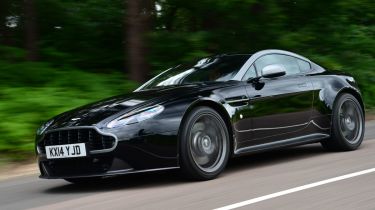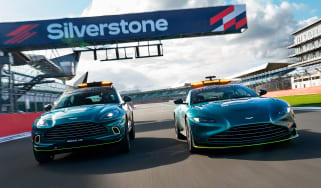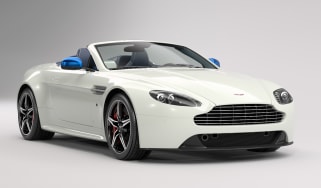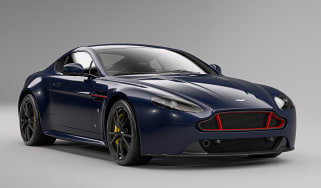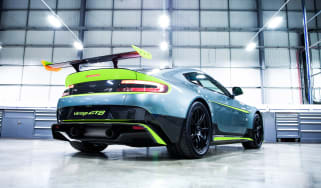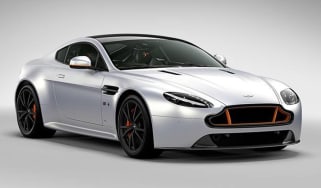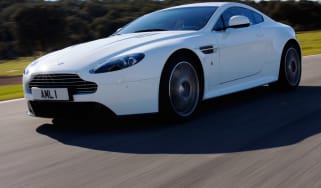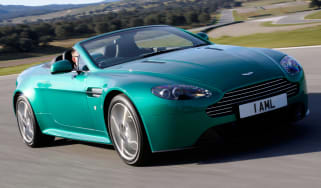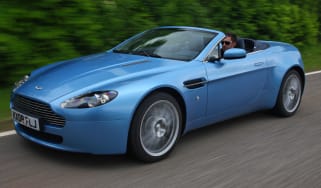Aston Martin V8 Vantage review
The Aston Martin V8 Vantage is one of the best-looking cars on the road, and it's a treat to drive as well

Instantly recognisable and still one of the most beautiful cars on the road, the Aston Martin V8 Vantage is an industry pin-up.
Aside from the Cygnet city car, the Aston Martin V8 Vantage is the entry point to Aston's luxury sports car range. It's been on sale since 2006, but it still looks great, and constant revisions and updates mean the V8 Vantage is still able to compete against rivals such as the Jaguar F-Type Coupe and Porsche 911.
The latest model has a 4.7-litre V8 that makes 420bhp, and it's offered with a six-speed manual or Sportshift automatic, although the latter takes the edge off the driving experience. If you want a luxury GT for two that makes you feel a million dollars every time you drive it, then the British-built V8 Vantage is an excellent choice.
Keeping the nine-year-old Vantage on the radar of buyers has been no easy task for Aston Martin, but a succession of special-edition ‘N’ models has helped. The latest N430 takes the tried and tested approach of adding more power and a few exclusive extras to give the Vantage added allure. The N430 commands a premium over the standard V8 Vantage, but offers the same 430bhp output as the more expensive Vantage S – making it something of a bargain in Aston terms.
Engines, performance and drive
The V8 Vantage is powered by a thunderous 4.7-litre V8. Although relatively old when compared to newer engines now offered by the likes of Porsche, Mercedes and Audi, it still has a healthy slug of power and loves to be put to be work. The Aston really wants you to push it to get your entertainment’s worth: peak power is locked away at the top of the rev range, and it's a similar story with the maximum torque figure.
More reviews
Car group tests
In-depth reviews
Road tests
- New Aston Martin Vantage 2024 review: Britain's answer to the Porsche 911 Turbo
- New Aston Martin V12 Vantage 2022 review
- New Aston Martin Vantage F1 Edition 2021 review
- New Aston Martin Vantage Roadster 2020 review
- New Aston Martin Vantage AMR 2019 review
- New Aston Martin Vantage 2018 review
- New Aston Martin Vantage 2018 prototype review
While driving purists rightly celebrate the fact that you can still buy a supercar with a manual transmission in 2014, the box feels increasingly cumbersome in an era of near-perfect semi-automatics. Unless you crave the ultimate control of a three-pedal set-up, you’ll find the heavy shift and ponderous clutch a real burden – especially when driving in traffic.
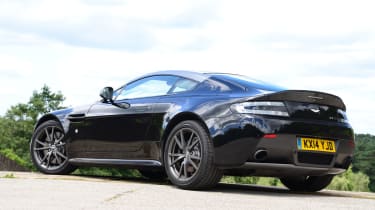
The downside is a slightly firm ride, but despite this the Aston is a car that inspires confidence and delivers plenty of feedback through the controls.
MPG, CO2 and Running Costs
No surprises here: keeping an Aston Martin on the road is not a cheap business. Thanks to around 20mpg economy and a £500-a-year road tax bill, you’ll need deep pockets to keep the wheels of your V8 Vantage turning. Add in group 50 insurance and thumping tax liabilities for business users, and you can begin to understand why cars like this are fairly exclusive.
Nevertheless, Aston Martin has made great strides over recent years to make aftercare as affordable as possible, and has introduced a fixed-price servicing scheme as part of this. However, owners will pay £651 for the first 10,000-mile check-up, and £680 for the second, 20,000-mile service.
Interior, design and technology
It’s hard to believe that nearly a decade has passed since the Vantage burst on to the scenes. It’s testament to the original Henrik Fisker design that it still turns heads wherever it goes.
Key to the Vantage’s timeless appeal has been its simplicity. The profile is constructed with clean, precise lines that perfectly intersect where they cause the least visual clutter. The proportions are millimetre perfect, whichever angle you view the car from, while details such as the distinctive tailgate spoiler and front wing air vents are effortlessly integrated into the design.
The passage of time, however, has not been as kind to the interior. Where the rival Jaguar F-Type excites with its bespoke switchgear and attention to detail, the Vantage looks and feels like a car from another generation.
Aston quite rightly emphasises the fact that every Vantage is hand-made – and it’s a tribute to the assembly team that it all works as it should. But look beyond mere functionality, and this car starts to lose its appeal. Such has been the advance in cabin quality over the past five years that the Aston’s hand-me-down switchgear and controls are starting to look fairly ancient.
Practicality, comfort and boot space
Simply opening the door is an experience to savour – it swings out and up on gas struts, revealing expensive materials, gorgeous lighting and an excellent seating position.
The clunky flyaway handbrake by the driver’s door feels like an anachronism in the current era of electric parking brakes, while the steering column could do with more adjustability.
There's a DBS-style centre console, and the last set of revisions got rid of most of the Ford switchgear, although what's left doesn't detract from the air of sophistication. The Vantage is a strict two-seater, but the hatchback rear end ensures it’s almost as practical as more mainstream models.
Reliability and Safety
Having been around for nearly 10 years, the Vantage is a very well sorted car. Any early problems and niggles have long since been resolved and it enjoys a healthy reliability record. Like the rest of the car, the engine is an established design and isn’t particularly stressed in day-to-day motoring.
As with all hand-built cars, there’s always a margin for human error, but the staff at Aston Martin’s state-of-the-art Gaydon factory in Warwickshire certainly know how to put a car together, with problems few and far between.
